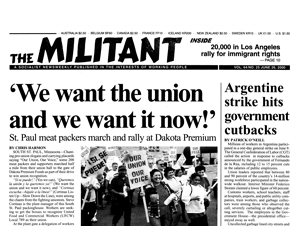

| A socialist newsweekly published in the interests of working people Vol. 64/No. 25 U.S. rulers seek to strengthen their nucelar edge From the pages of 'Capitalism's World Disorder' The excerpt below is taken from "Youth and the Communist Movement," a talk given in June 1992 to a meeting of the Communist League and Young Socialists in the United Kingdom. The entire presentation appears in Capitalism's World Disorder: Working-Class Politics at the Millennium. The excerpt can be found on pages 427-430. Copyright © 1999 Pathfinder Press, reprinted by permission. BY JACK BARNES The United States ruling class is armed to the teeth and will not back off being the world's top cop--with the world's mightiest conventional and strategic nuclear arsenal in its holster. Washington is and will remain both an Atlantic and a Pacific power, and it will react to defend U.S. capitalist interests wherever, and by whomever, those interests are endangered. But it will pay the consequences. I do not know how the big-business press here in Britain played up Russian president Boris Yeltsin's visit to Washington earlier this month. But in the United States, and I suspect elsewhere around the world, headlines proclaimed that Yeltsin and Bush had announced plans to destroy a far greater number of nuclear warheads than had previously been anticipated. As a result, the world is supposed to be less threatened by the use of nuclear weapons. What is actually happening, however, is the opposite of what the headlines imply.
What Bush is really pushing Yeltsin to concede, in exchange for promised economic aid, is Moscow's agreement to set aside the 1972 Anti-Ballistic Missile treaty, allowing Washington the option to deploy a ground-based antiballistic missile system. The U.S. rulers intend to place themselves in a stronger position against all those powers that are continuing to build up their nuclear arsenals, and against all those that will acquire them in the coming decades. That is what the talks with Yeltsin are all about, not the destruction of nuclear weapons on the road to a more peaceful world.1 There will be more armed conflict and spreading wars in coming years. More governments in every part of the world will get their hands not only on nuclear weapons but also on ballistic missile delivery systems. At the same time, however, the working class and other toilers who have to fight and die on behalf of the interests of the exploiters will be a powerful source of resistance to such wars and preparations for war. We will have the opportunity to take power out of the hands of the capitalist rulers who are responsible for war, and for the nuclear threat that continues to hang over humanity. During the war drive and bloody onslaught against Iraq, communist workers learned in practice how we can fight to defend space in the working class and labor movement to campaign against imperialism and war. We did so even during the stage when the capitalist rulers are always most successful in mounting patriotic backing for their war efforts--when U.S. forces go into combat, but before body bags begin returning home in unexpectedly large numbers. During the Gulf War, we saw just the beginnings of how antiwar resistance can develop among workers and youth. And we will see a similar process--similar debates, similar pressures, similar opportunities--as the capitalists mount more war drives and launch new wars. Implementation of Clinton's plan would mark a substantial escalation of strategic weaponry, placing Washington in a position to launch a nuclear first strike for the first time since the development by the Soviet Union of a hydrogen bomb and intercontinental missiles. Constructing the planned U.S. antiballistic missile system would abrogate the 1972 ABM agreement signed by Washington and Moscow, under which both governments are currently bound not to develop such a system. While the U.S. government claims this move is designed solely as "defense" against "threats" from "rogue nations" such as North Korea and Iraq, its first strategic target is in reality the workers state in China--which has a substantially less developed nuclear arsenal and missile system than the workers state in Russia. Beijing immediately protested Washington's announcement. "It will have a comprehensive and far-reaching impact on the strategic balance and stability of the region and world at large in the 21st century," said a Chinese foreign ministry spokesperson. The statement warned of the added danger of joint development of an antimissile system between the U.S. and other countries, clearly referring above all to the often-mentioned potential U.S. partners near China's borders, such as Taiwan, Japan, and south Korea, as well as Russia. Already confronted with Washington's decision to expand NATO membership to several former Warsaw Pact countries close to Russia's borders, Moscow has so far refused to ratify the START II treaty on nuclear warheads reduction, which was the topic of the 1992 talks between Bush and Yeltsin referred to above. Clinton's ABM plans diminish still further the chances of any START II ratification, and bring the danger for Russia of a U.S. first-strike capacity that much closer.
|
